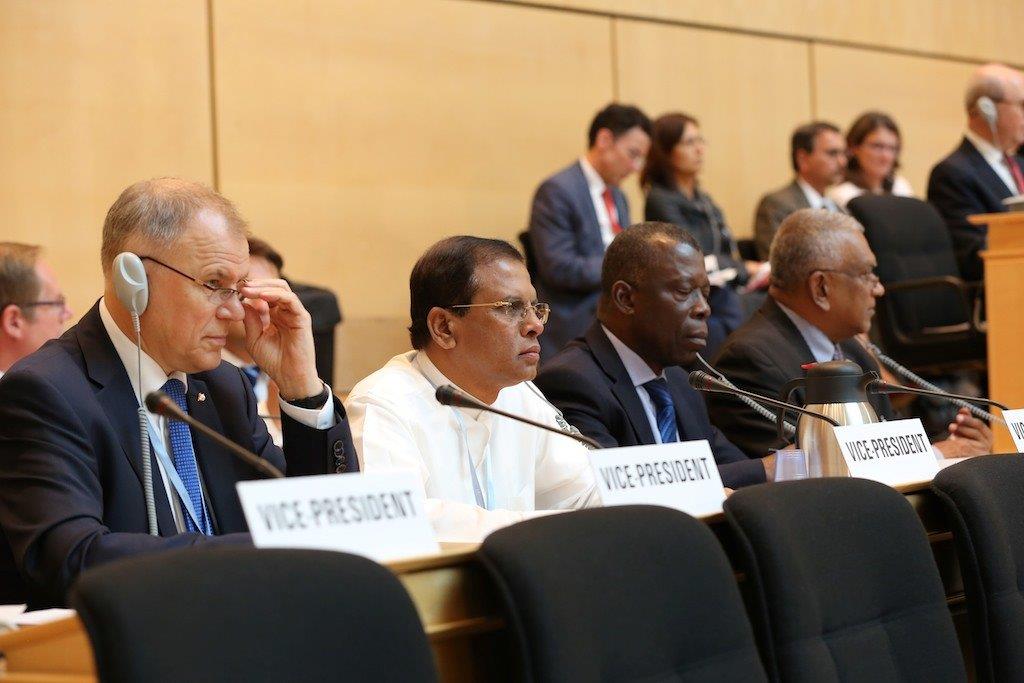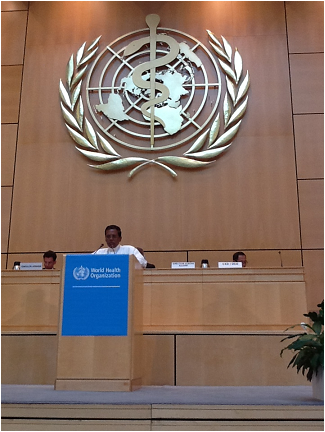Minister of Health and Vice President of the 67th World Health Assembly, Maithripala Sirisena, addressing the World Health Assembly today (20th May 2014) said “the World Health Assembly has a historic opportunity to once again appeal to the world community to demand those countries releasing large amount of carbon-dioxide and offensive gases to the atmosphere - to adopt carbon free energy sources to run their industries. These developed nations should be held responsible for releasing large quantities of offensive gases, and the people in developing and poor countries are the victims that have to bear the consequences. Let us all be eco-centered rather than ego-centered so that we can all live happily and with good health and leave to the future generations a much better and a healthy place to live in.

Minister Sirisena is leading the Sri Lankan delegation currently attending the sixty-seventh session of the World Health Assembly (WHA) taking place in Geneva during 19–24 May 2014. During the Opening Session on Monday (19 May 2014) in Geneva, Minister of Health MaithripalaSirisena was elected as one of the Vice Presidents of the World Health Assembly.

The World Health Assembly is the decision-making body of WHO and is attended by delegations from all WHO Member States and focuses on a specific health agenda prepared by the Executive Board.The main functions of the World Health Assembly are to determine the policies of the Organization, appoint the Director-General, supervise financial policies, and review and approve the proposed programme budget.
Full Statement of Hon. Minister of Health is given below.
STATEMENT BY HON. MAITHRIPALA SIRISENA, MINISTER OF HEALTH OF SRI LANKA TO THE 67TH SESSION OF THE WORLD HEALTH ASSEMBLY - 20.05.2014
Mr. President,
Dr. Margaret Chan, Director General of World Health Organization
Excellencies,
Distinguished Delegates,
Ladies and Gentlemen
First and foremost as the Minister of Health and Head of the Delegation I wish to express my sincere thanks to the Director General of WHO Dr.Margaret Chan for the invitation extended to me and my Delegation to participate in this Assembly and the excellent arrangements made for our stay in this beautiful country.
While I congratulate the President on his election, I also thank Members for the honour placed on Sri Lanka by electing me as a Vice President.
As the Minister of Health of the Government of Sri Lanka I wish to express our view regarding the impact of Climatic change on Health Sector in Sri Lanka and globally.
Our lives are connected to the climate. As a result of massive amount of carbon dioxide and other green house gases emitted to the atmosphere we see changes to the relatively stable climate that we enjoyed in the past. Our planet will soon become a sick giant, so will be its people.
The industrialized nations are the worst offenders in this scenario. They emit the most amounts of offensive gases to the atmosphere. Fossil fuels and low quality gasoline used to power diesel engines contribute a major share of carbon-dioxide that pollutes the environment.
Climate change can be destructive to human health and well-being of the people. In a tropical country like Sri Lanka it increases the risk of some infectious diseases which are spread by mosquitoes and other insects. These vector borne diseases include dengue fever and malaria.
Dengue fever has become a big threat to our country. It was so bad that as a result of my personal appeal a Presidential task force was formed under the leadership of His Excellency the President Mahinda Rajapakse to fight the spread of this disease.
Several important Ministries such as Defense, Law and Order, Local Government, Public Administration, Education, Disaster Management were included in this Task Force.
The Ministry of Defense together with the armed forces and the Police Department joined in activities to clear mosquito breeding places in all districts of the country.
All these activities and specially the dedication of our clinical and public health staff have contributed greatly towards bringing down the dengue deaths to a very low figure.
Sri Lanka can be taken as a role model for eliminating malaria. Since 2012 to date we have not come across a single local case of malaria.
According to Sir Richard Feachem, an eminent Doctor, and director of the Global Health Group, I quote, “Sri Lanka is showing the world how to eliminate malaria. The country has made extraordinary progress, reducing malaria by 99.9 percent in the past decade’. Unquote.
The ninth annual general meeting of the Malaria Elimination Group of Global Health, Chaired by Sir Richard Feachem will be held in Sri Lanka from 15th to 17th October 2014, I hope many of you present here will attend this meeting.
Finally, let this Assembly be an historic opportunity to once again appeal to the world community to demand those countries releasing large amount of carbon-dioxide and offensive gases to the atmosphere - to adopt carbon free energy sources to run their industries. These developed nations should be held responsible for releasing large quantities of offensive gases, and the people in developing and poor countries are the victims that have to bear the consequences. Let us all be eco-centered rather than ego-centered so that we can all live happily and with good health and leave to the future generations a much better and a healthy place to live in.
Thank you.
Permanent Mission of Sri Lanka
Geneva
20th May 2014




